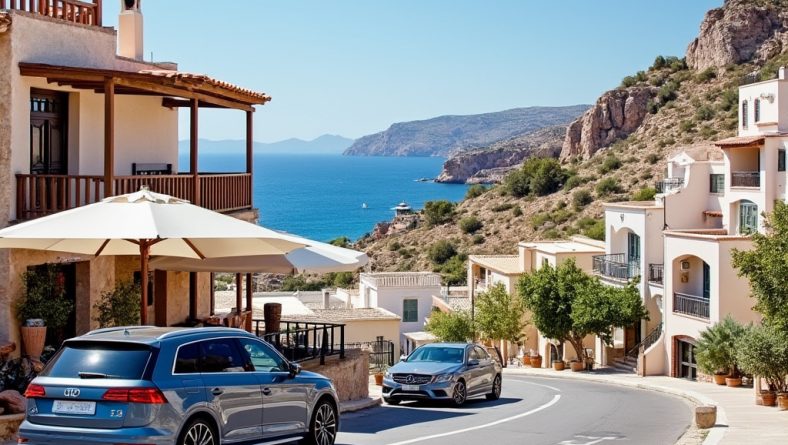Comprehensive Guide to Car Hire in Greece
Why Choose Car Hire in Greece?
Car hire in Greece is the perfect way to explore this enchanting country, rich in history, culture, and natural beauty. From ancient ruins and vibrant cities to picturesque islands and stunning coastlines, renting a car offers the freedom to discover Greece’s treasures at your own pace.
Benefits of Hiring a Car in Greece:
- Flexibility: Tailor your itinerary without relying on public transport schedules.
- Comfort: Travel in a private vehicle suited to your needs.
- Accessibility: Reach remote beaches, mountain villages, and archaeological sites.
- Scenic Drives: Enjoy breathtaking routes through the countryside and along the coast.
Requirements for Car Rental in Greece
Before you hire a car in Greece, ensure you meet the following requirements:
- Age Limit: Minimum age is typically 21 years old. Drivers under 25 may incur a young driver surcharge.
- Driving License:
- Valid National License: Must have been held for at least one year.
- International Driving Permit (IDP): Required if your license is issued outside the EU or not in the Roman alphabet.
- Identification: A valid passport or national ID card.
- Credit Card: For security deposit and payment. Debit cards may not be accepted.
- Insurance: Basic insurance is usually included; consider additional coverage for extra protection.
Choosing the Right Rental Car
When considering car hire in Greece, think about the following:
- Vehicle Size: Compact cars are ideal for city driving and narrow streets; larger vehicles or SUVs are suitable for families or rugged terrain.
- Fuel Efficiency: Petrol and diesel options are available; consider fuel costs for long journeys.
- Transmission: Manual transmission is common; automatic vehicles are available but may be limited and more expensive.
- Additional Features: GPS navigation, child seats, and Wi-Fi hotspots can be added to your rental.
Understanding Rental Costs and Insurance
Rental Costs
- Base Rate: Varies depending on vehicle type, rental duration, and season.
- Additional Fees: Airport surcharge, young driver fee, additional driver fee, one-way rental fee.
- Taxes: VAT is typically included in the quoted price.
Insurance Options
- Collision Damage Waiver (CDW): Reduces your financial liability in case of damage.
- Theft Protection (TP): Covers loss due to theft.
- Third-Party Liability Insurance: Mandatory coverage for damages to others.
- Super CDW/Zero Excess: Further reduces or eliminates the deductible.
- Personal Accident Insurance (PAI): Covers medical expenses for the driver and passengers.
Tip: Review the insurance policy carefully when arranging your car hire in Greece and consider additional coverage for peace of mind.
Driving in Greece: What to Expect
Driving Laws and Regulations
- Drive on the Right: Same as most European countries.
- Seat Belts: Mandatory for all passengers.
- Speed Limits:
- Urban areas: 50 km/h (31 mph)
- Open roads: 90 km/h (56 mph)
- Expressways: 110 km/h (68 mph)
- Highways: 130 km/h (81 mph)
- Mobile Phones: Use of handheld devices while driving is prohibited; hands-free devices are allowed.
- Alcohol Limit: 0.05% blood alcohol concentration; lower limit of 0.02% for new drivers (less than 2 years of experience).
- Lights: Use dipped headlights during poor visibility.
Required Documents
- Driver’s License and IDP (if applicable)
- Rental Agreement
- Vehicle Registration and Insurance Papers
Tip: Always carry these documents while driving your rental car in Greece.
Navigating Greek Roads and Traffic
Road Conditions
- Highways (Ethniki Odos): Generally well-maintained; tolls apply on major routes.
- Secondary Roads: Conditions vary; may be narrow or winding, especially in rural areas.
- Island Roads: Can be steep and narrow; caution is advised.
Traffic and Signage
- Traffic: Can be heavy in cities like Athens and Thessaloniki; lighter in rural areas.
- Road Signs: In Greek and English; distances in kilometers.
- GPS Navigation: Highly recommended; ensure maps are up to date.
Driving Etiquette
- Local Driving Habits: Drivers may be aggressive; stay alert and drive defensively.
- Pedestrians and Cyclists: Common in urban areas; always yield at crosswalks.
Cross-Border Travel with Your Rental Car
Neighboring Countries
- Common Destinations: Albania, North Macedonia, Bulgaria, Turkey.
- Rental Agency Policies: Not all companies allow cross-border travel; permission is required.
- Additional Fees: Cross-border fees or additional insurance may apply.
- Insurance: Ensure your coverage is valid in the countries you plan to visit.
Border Crossing Requirements
- Valid Passport and IDP (if applicable)
- Green Card Insurance: Proof of insurance valid in the destination country.
- Vehicle Documents: Rental agreement indicating permission for cross-border travel.
Tip: Inform the rental company in advance to arrange necessary documentation for cross-border car hire in Greece.
Fueling Up: Gas Stations and Fuel Types
Availability
- Gas Stations: Widely available in urban areas and along main roads; less frequent in remote regions and on some islands.
- Operating Hours: Typically open from 7 AM to 10 PM; some stations offer 24/7 service.
Fuel Types
- Unleaded Petrol (Benzin): Available in 95 and 100 octane.
- Diesel (Diesel): Common and cost-effective.
- LPG (Autogas): Available at select stations.
Payment Methods
- Cash: Euro (€) is the official currency.
- Credit Cards: Widely accepted at gas stations, but it’s advisable to carry cash in rural areas.
Parking in Greek Cities
Urban Areas
- Parking Zones: Designated areas with varying time limits and fees.
- Blue Zones: For visitors; pay-and-display system.
- White Zones: Free parking where permitted.
- Yellow Zones: Reserved for residents or commercial vehicles; no parking allowed.
- Payment: Meters, pay stations, or mobile apps; fines apply for non-payment.
- Parking Garages: Available in major cities like Athens and Thessaloniki.
Tips for Parking
- Avoid Illegal Parking: Vehicles may be towed or fined.
- Secure Valuables: Do not leave belongings visible in the car.
- Hotel Parking: Many accommodations offer parking facilities; inquire when booking.
Top Destinations to Visit by Car
1. Athens
- Highlights: Acropolis, Parthenon, Plaka district.
- Experience: Explore ancient history and vibrant city life.
2. Peloponnese Peninsula
- Attractions: Ancient Olympia, Mycenae, Nafplio.
- Activities: Discover archaeological sites and picturesque towns.
3. Meteora
- Features: Monasteries perched atop towering rock formations.
- Access: Scenic drive through Thessaly region.
4. Delphi
- Historic Site: Ancient sanctuary and Oracle of Delphi.
- Experience: Immerse yourself in Greek mythology.
5. Thessaloniki
- Highlights: White Tower, Aristotelous Square, Byzantine walls.
- Activities: Enjoy the cultural capital of northern Greece.
6. Crete
- Access: Ferry your car to the island or rent upon arrival.
- Attractions: Knossos Palace, Samaria Gorge, beautiful beaches.
7. Santorini
- Note: Cars can be rented on the island.
- Features: Iconic blue-domed churches, stunning sunsets, volcanic beaches.
8. Kos
- Features: Sandy beaches, ancient ruins, vibrant nightlife.
- Attractions: Asklepion archaeological site, Neratzia Castle, and traditional villages like Zia.
- Activities: Water sports, cycling (Kos is known as the bicycle island), and exploring local cuisine.
FAQs about Car Hire in Greece
1. Is it safe to drive in Greece?
Yes, driving in Greece is generally safe. Roads are well-maintained, especially highways. However, be cautious in rural areas and islands where roads may be narrow or less developed.
2. Do I need an international driving permit (IDP)?
If your driver’s license is issued outside the EU or not in the Roman alphabet (e.g., Arabic, Cyrillic, Chinese), an IDP is required when you hire a car in Greece.
3. Can I rent a car without a credit card?
Most rental companies require a credit card for the security deposit. Some may accept debit cards, but options are limited, and additional conditions may apply.
4. Are automatic cars available for rent?
Yes, automatic vehicles are available but may be limited and more expensive. It’s advisable to book in advance if you prefer an automatic car.
5. What are the fuel prices in Greece?
Fuel prices fluctuate but are generally higher than in some other European countries. Diesel is often slightly cheaper than petrol.
6. Can I cross the border with my rental car?
Yes, but you must inform the rental company in advance and ensure you have the necessary documentation and insurance. Additional fees may apply for cross-border car hire in Greece.
7. Are there toll roads in Greece?
Yes, Greece has toll roads, especially on major highways connecting cities. Tolls can be paid in cash or by credit card at toll booths.
8. What should I do in case of an accident or breakdown?
Contact your rental company immediately for assistance. They will provide guidance and support, including roadside assistance if included in your rental agreement.
9. Is GPS navigation reliable in Greece?
Yes, GPS navigation is generally reliable. Ensure your device has up-to-date maps. In mountainous or remote areas, signal may be limited, so consider offline maps as a backup.
10. Do I need to pay for parking?
Yes, in cities and popular tourist areas, paid parking is common. Always check signs for parking regulations and fees to avoid fines.
Final Tips for a Safe Journey
- Plan Your Route: Research your destinations and routes, especially when traveling to remote areas or islands.
- Stay Informed: Check for any travel advisories or local regulations.
- Respect Local Laws: Adhere to speed limits and traffic laws.
- Be Prepared: Carry a first-aid kit, reflective vest, and warning triangle (usually provided with the rental car).
- Enjoy the Journey: Take time to experience Greece’s rich culture, cuisine, and breathtaking landscapes.
Embark on your Greek adventure with confidence by arranging your car hire in Greece through 365carhire.com. Enjoy the freedom to explore this captivating country at your own pace!





